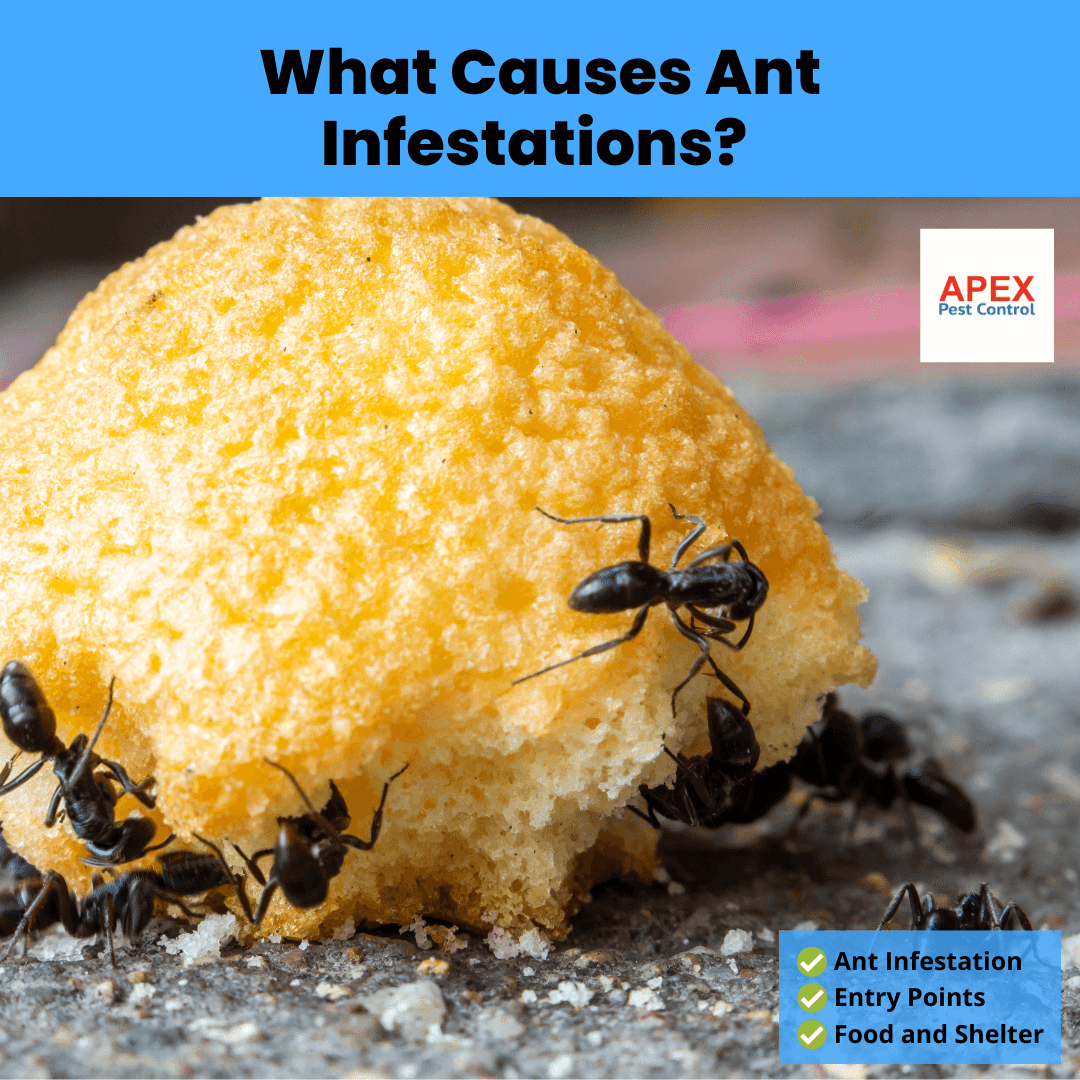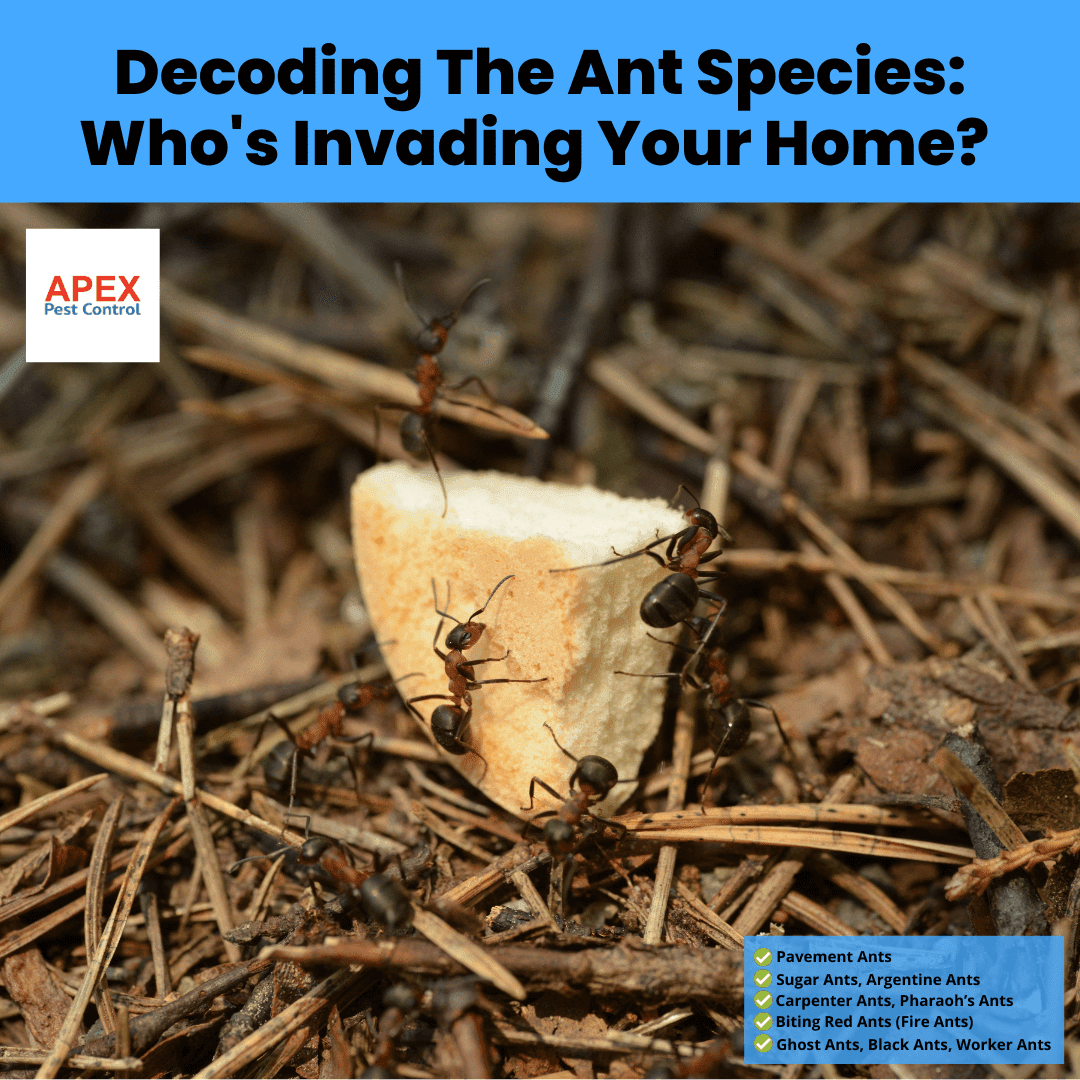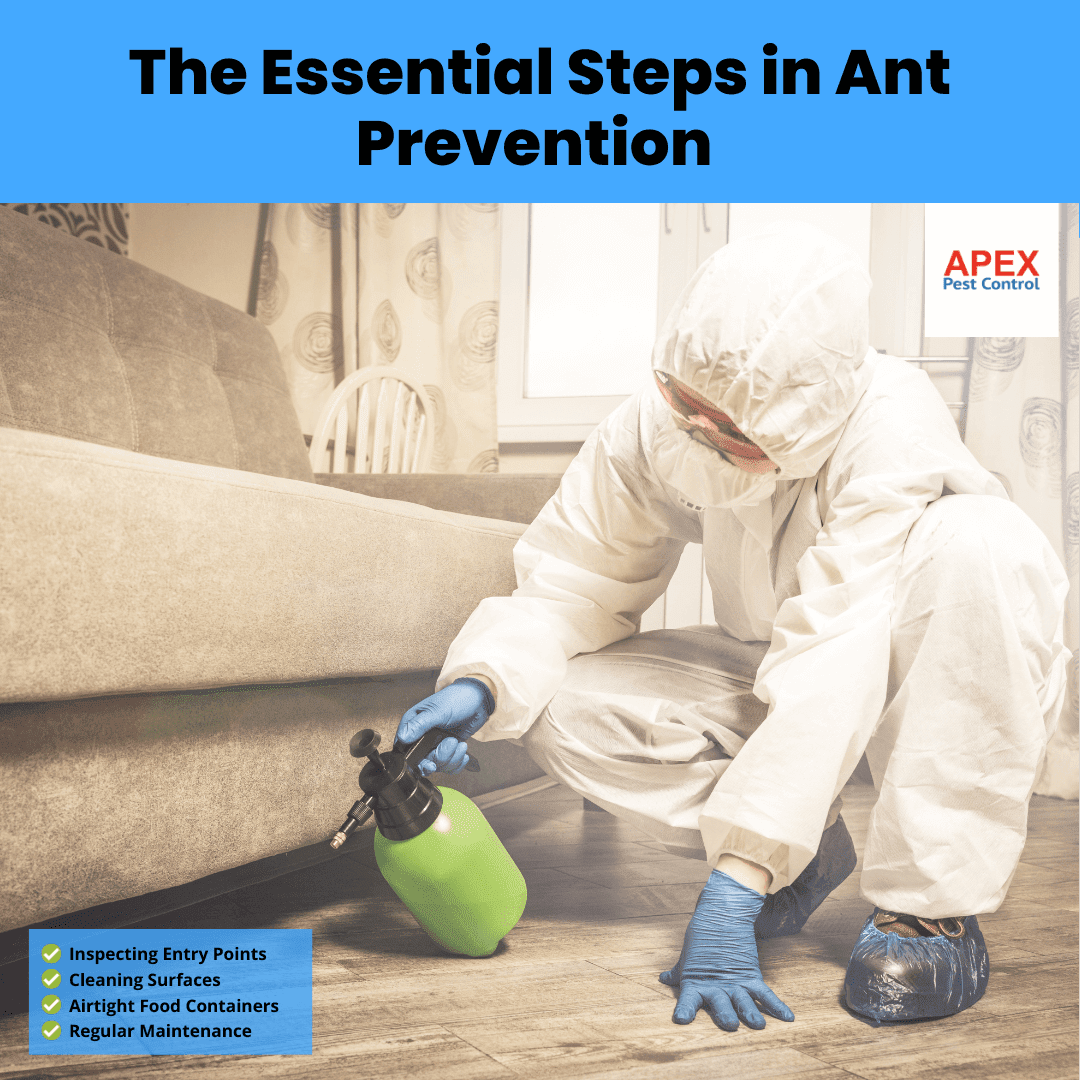Why Do You Have an Ant Infestation in Your House?
So, you’ve found ants marching in a straight line across your kitchen counter, haven’t you? Or perhaps you’ve stumbled upon a few ants busily collecting food crumbs in your living room.
While a single ant might not raise alarms, multiple ants usually spell out an ant infestation in the house. But how did these tiny creatures end up in your home? And, importantly, how can you ensure they don’t come back? Let’s embark on an investigative journey.
What Causes Ant Infestations?

Food and Shelter: The Prime Attractions
Like humans, ants, too, gravitate toward comfortable environments. Your basement or any part of your home could be the next hotspot for these tiny invaders, especially if there’s easy access to food.
A few leftover food scraps or poorly stored pet food can kickstart an ant invasion, requiring immediate and controlled measures.
Ants watch for any signs of food, and once they find it, they lay down a pheromone trail for others to follow, leading to more ants marching into your abode. This is where ant baits can be handy.
Ant baits are designed to attract ants, and these baits contain poisoned food that they carry back to their colony, helping eliminate ants permanently.
Entry Points: Their Covert Passageways
Ants are quite the experts when it comes to sneaking in. They can find the tiniest cracks or gaps, be it under doors or poorly sealed windows. They don’t need a big entrance; tiny ants can squeeze through almost invisible spaces, leading to unwanted ant colonies forming inside your home.
Regular maintenance can thwart these covert infiltrations. Ensuring there are no entry points like tiny cracks, especially in damp wood areas, is crucial for ant prevention. Also, pouring boiling water in visible ant nests outside can deter them from getting closer to the house.
Keeping the house dry, especially in the basement, is another preventive measure, as most ants, including the odorous house ants, detest dry areas.
Decoding Ant Species: Who’s Invading Your Home?

The Common Culprits
Pavement Ants: Often seen scurrying on pavements, these ants aren’t just content with the great outdoors. If they find ant-friendly conditions, they’ll be tempted to invade indoors. Especially if there’s food lying around, attracting ants becomes all the easier.
Sugar Ants: Originally hailing from Australia, they’ve become quite the international traveller. A mere few drops of something sweet can attract a battalion of these ants to your home.
Carpenter Ants: No, they don’t carry tiny tool belts, but they are adept at creating nests within damp wood. Their activity might lead to structural damage if not addressed. While you can use various ant killers, understanding their behaviour is essential for effective ant removal.
Argentine Ants: South America’s tiny export to the world, these ants can pose challenges for residential pest control. Their rapid colonies can quickly escalate an ant problem if not managed timely.
Pharaoh’s Ants: Their regal name doesn’t keep them from making a humble abode in your house. Given their preference for warmer environs, homes, especially during colder months, seem inviting.
Biting Red Ants (Fire Ants): A sting from these can leave a sharp burning sensation. While they mostly love your garden, they might sneak indoors seeking food and water.
Ghost Ants: Their almost invisible demeanour doesn’t mean they won’t cause problems. Drawn primarily to sugary substances, they can be a real pain when they decide to visit.
Black Ants: Commonly spotted in residential areas, these ants might seem harmless but can quickly escalate into a problem, especially if there is exposed food lying around.
Worker Ants: Playing a vital role in the ant colony hierarchy, these are the unsung heroes ensuring that the entire colony functions smoothly. And remember, if you spot one ant, there are likely many more hiding out of sight.
Understanding the Depth of Your Ant Problem

Every ant you see in your house represents a larger community hidden from view. The key to handling ant infestations is not just about addressing visible ants but also tackling the root—their nests and colonies.
Spotting an Ant Colony: If there are ants marching in your living room, they’re part of a larger ant colony nearby. Integrated pest management can be instrumental in addressing this.
Ant Nests and Holes: These are your unwanted neighbours. Ants create nests within the house’s very foundation. You might not see them, but if you regularly spot ants inside, they’re probably nesting close.
The Mound Builders: Ant Hills, often visible in gardens, these mounds of sand or soil can conceal an entire colony beneath. And remember, the ant hills outside could lead to an ant problem inside.
Following the Scent: Ant Trails: The aligned marching of ants isn’t a parade, but them following a scent trail. Understanding this can help in effective ant-repellent strategies. If there’s a trail, it’s leading to a food source. Thus, ensuring no food is left exposed and keeping areas clean can help deter these trails.
Natural Solutions for an Ant-Free Home

When ants invade your house, it can feel like a never-ending battle. While there are numerous commercial pest control solutions available, many homeowners are now opting for natural remedies.
These eco-friendly methods can be just as effective in ensuring your home remains ant-free, and they come without the potential risks posed by chemical solutions.
Boric Acid
A stalwart in the battle against ants, boric acid offers a two-pronged approach. Mixed with sugar, it becomes an irresistible yet toxic ant bait. As ants take this poisoned food back to their colony, it helps eliminate the entire community.
Remember, while it’s a natural ant remedy, always keep it out of reach of children and pets.
Lemons
The sharp scent of citrus fruits, especially lemons, can act as a strong deterrent for ants. Applying a few drops of lemon juice at entry points can prevent ants from entering your home.
Not only does it disrupt their scent trails, but the tangy aroma can also mask food scents that often attract these pests.
White Vinegar
A staple in most kitchens, white vinegar is more than just an ingredient. Using a spray bottle, create a mixture of equal parts white vinegar and water. This solution not only acts as an ant repellent but also cleans surfaces, ensuring any leftover food ants might get attracted to is wiped clean.
Essential Oils
These aromatic wonders have a multitude of uses, and ant prevention is certainly on the list. Essential oils such as peppermint and tea tree oil can be formidable ant repellents.
Dabbing a little on cotton balls and placing them in strategic locations can make ants think twice before setting up shop in your home.
Chalk
This is a surprising entry on this list, but chalk can play a pivotal role in keeping ants at bay. Drawing lines around entry points might seem like child’s play, but in reality, it confuses ants and disrupts their pheromone trails. The calcium carbonate in chalk acts as a barrier, making it challenging for ants to cross.
The Essential Steps in Ant Prevention

Ant infestations can turn your peaceful abode into a bustling ant metropolis. Here’s how you can establish strong defences and keep these tiny invaders at bay:
- Regularly inspect entry points like windows and doors for gaps. Seal them promptly to deter ants from entering.
- Clean surfaces, especially in the kitchen, to remove any sticky residue or leftover food scraps. This reduces the food source for ants.
- Invest in airtight containers for storing food items, especially sugary treats, which ants love.
- If you spot any ant trails, take immediate action. Whether it’s using natural remedies like cayenne pepper or coffee grounds or consulting a pest control expert, timely intervention can prevent a full-blown ant infestation.
- Regular maintenance, be it addressing damp wood issues, ensuring basements are dry, or simply being vigilant about food storage, can go a long way in ensuring your home remains ant-free.
Natural solutions often require patience and persistence. However, with the right approach and by using the resources at hand, you can ensure that the only guests in your home are the ones you’ve invited.
Can You Really Win Against Ants?

Certainly! With the right knowledge and preventive steps, you can tackle any ant problem head-on. Remember, the goal isn’t just to repel the ants but to make your home unattractive for them in the first place.
Understanding the “why” behind your ant infestation is half the battle.
By identifying the reasons, be it that slice of cake you left out overnight or the small gaps in your window sills, you can target the root cause and not just the symptoms.
It’s crucial to adopt a proactive approach, combining preventive measures with effective solutions. After all, a home is a place of comfort, not a haven for uninvited ants.
So, while ants might be tiny and seemingly insignificant, underestimating them can lead to bigger problems. But with consistent effort and the right strategies, you’ll be well on your way to reclaiming your ant-free space.
For information on getting rid of ants in your garden, please read our post: https://apex-pest-control.co.uk/how-to-get-rid-of-ants-in-garden/
FAQs
What attracts ants inside the home?
Ants are attracted to food sources, especially sugary substances, and shelter.
How do ants get into the home?
They exploit tiny cracks, gaps under doors, and poorly sealed windows.
Which essential oil is effective against ants?
Essential oils like peppermint and tea tree are known to deter ants.
Are all ants harmful?
No, not all ants cause harm or damage. However, some, like carpenter ants, can damage wooden structures.
How are soldier ants different from worker ants?
Worker ants are females responsible for maintaining the colony, while soldier ants defend the colony.

Tony Johnson, Founder & Lead Technician at Apex Pest Control, is a BPCA and NPTA accredited pest management expert with over 35 years’ hands-on experience. Tony specialises in Integrated Pest Management and ensures all services comply with UK pest legislation, including the Wildlife and Countryside Act 1981 and COSHH Regulations 2002. His commitment to continual learning and adapting to industry best practices means clients receive effective, safe solutions for pests affecting homes and businesses across South Yorkshire. Tony’s dedication to professional standards, ethical treatment methods, and local expertise has made him a trusted partner for pest control and prevention.
-
BPCA & NPTA accredited | CHAS certified
-
Committed to UK pest law compliance & safety
-
Focused on effective, ethical pest management for South Yorkshire


